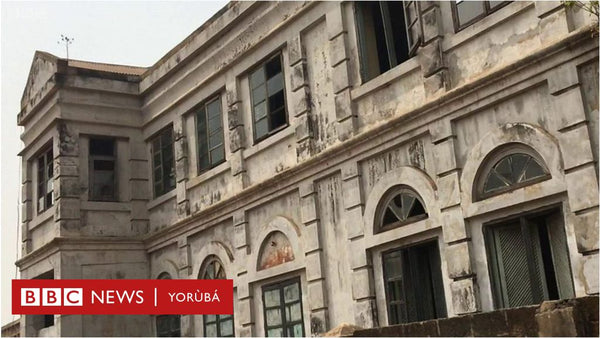When people talk of must-see places in Ibadan, they miss out one of the most remarkable landmarks in the city–the era-defining Adebisi Mansion in Idikan area. Adebisi was the son of Adesina from Efon-Alaaye in Ekiti State. The mansion was built over two years with the best materials money could buy, it was completed in 1929, the same year the famed Mapo Hall was commissioned by the British colonial government.

Remarkably, the mansion of 99 rooms and 34 pillars dwarfs Mapo Hall and it was the property of Sanusi Adebisi Giwa (1882-1938), a very successful farmer and businessman, who was also known for his philanthropy. If he were to be alive in our time, he would be in the same league with the likes of Aliko Dangote, Emmanuel Iwuanyanwu or MKO Abiola.
On the day I visit, there is a party in the compound, packed full with revellers feasting and enjoying rounds of fuji music. Upstairs in one of the living rooms, Chief (Dr.) Busari Adebisi, one of the patriarch’s grandchildren, is hosting some guests.
I imagine that his granddad must have sat here on many occasions to welcome VIPs on courtesy visits and, perhaps, climb down through the wooden stairs to attend to hundreds of peasants who thronged the compound seeking his charity. (He also used the dedicated hall downstairs for bigger meetings with chiefs and his extended family)

“We have had to lock up most of the rooms because it requires a lot to maintain them,” the retired lecturer of the University of Ibadan tells me. “But I must say that there is not a single wood in this building, from ceiling to floor-board, that has been repaired or replaced since it was built.”
Then, as now, the wealthy competed with the houses they built, its features and furnishings all considered. But being the first of its kind to be built by anyone in Ibadan, the privately funded Adebisi Mansion became a benchmark and spawned a lore all its own.
“There is a saying in Ibadan that has endured till today,” “It goes like this: ‘Anyone who plans to build a house like that of Adebisi will never build one in his lifetime,’ ”

Mogaji Adebisi explains the import of that statement. “They are not only talking about the edifice completely but the components of the edifice itself–the plank, the nature and character of the plank, the cement and so on, ” he says. The older Adebisi, he adds, sourced the wood from his expansive cocoa farm — that’s where he made his fortune, doing business with the Miller Brothers, later to become UAC– in Mamu, which he seasoned for five years before using them on the property.
Though the mansion stands solidly behind an equally solid fencing, it has lost its shine somewhat, a greater part of it covered in dust in and out; but it retains much of its architectural grandeur, even from a distance, including some of its 20th century fittings–fans, stools and all. In the late owner’s room, which I am allowed to enter, a polished wardrobe sits on the west wall, a throwback to a time long past.
Adebisi was a devout muslim and, like most, he never joked with the month of Ramadan, Eid el Fitri and Eid el Kabir. As expected for a man of his means and stature, his mansion was a mecca during the festivities.

“…his friends, business associates and well-wishers from outside Ibadan city would be making preparations on how to be in Ibadan on Eid day so as to have an opportunity to celebrate with Adebisi,” writes one of his biographers Jubril Aminu, in the book Beyond the Inimitable Edifice. “As a man of fashion, he would put on a befitting, roundish turban, a brand of dressing he introduced into the chieftaincy arena during his time.”
At the end of prayers at the eid grounds, most would return with him to the mansion at Idikan, the flamboyant character riding a horse and waving the horse-tail to the crowd.




